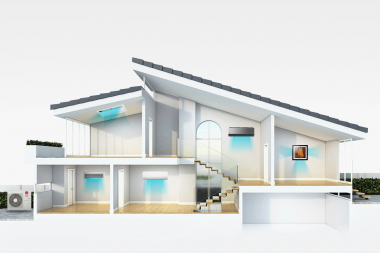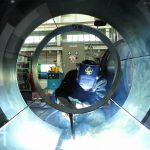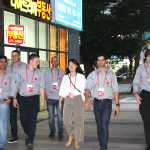
For some of us, the idea of winter conjures up images of shoveling snow of driveways and sidewalks or clearing snow and ice from our gutters and rooftops. Mounting snow and freezing temperatures can become a seemingly endless chore to attend to and ultimately can be dangerous, but there may be something else around the house that may also be affected by snow and ice. If this isn’t your first visit to our blog, then you must already know we’re talking about HVAC systems. While snow and ice collecting on your HVAC unit doesn’t necessarily mean disaster, attending to your system during heavy snow fall and freezing temperatures can keep issues at bay.
When Snow is on the Rise
 A heat pump smothered by snow can hinder system operation
A heat pump smothered by snow can hinder system operation
During heavy snowfall, an HVAC unit can become smothered in a mound of snow that could potentially restrict the operation of the unit. Since HVAC units require airflow to operate effectively, keeping an eye on your system when snow is piling up can prevent major problems. Keeping snow clear of fans and other components such as the fins near the condenser will alleviate excess stress on the heat pump. Be sure not to actually contact the unit with your shovel or any tool while clearing snow. Even a couple feet of snow can affect a heat pump. Visually inspect the outdoor unit to be sure it is not covered in snow or damaged. An impaired heat pump can drive up the electric bill or leave you freezing in your home.
Cold as Ice
 Ice buildup on a heat pump can potentially become a disaster for an HVAC system
Ice buildup on a heat pump can potentially become a disaster for an HVAC system
Ice in certain regions can commonly encase an HVAC unit and cause significant problems. The ice buildup impairs the coils of a heat pump. Although light ice buildup is not a problem as heat pumps have defrost cycles to deal with light ice, sleet in colder temperatures or freezing rain can cause major buildup. Ice buildup can cause the system to emergency shut off and stop heating the home and potentially cause pipes to freeze and burst. Ice buildup can also cause the system to overwork with excessive cycling and drive up electric build and cause excessive wear on components. Building a cover to shield your HVAC unit from sleet and freezing rain as well as snow can protect it from issues related to buildup. Insulating pipes, particularly pipes that are exposed or outdoors, can also help prevent damage. Be sure the defrost cycle is working properly on your heat pump.
In many parts of the world, January and February are the most brutal of winter months and weather can be quite severe. It is important to maintain a properly operating HVAC system in order to stay warm, keep costs down and ensure the long life of your system. Be sure to take time and maintain your HVAC system to avoid bigger issues later. Stay warm and safe this winter!


































